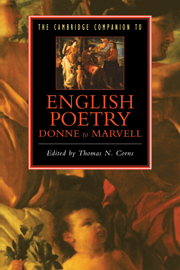2 - The politics of gender
from Part 1 - The context
Published online by Cambridge University Press: 28 May 2006
Summary
Although it is unarguably the case that governmental and other state structures have changed since the seventeenth century, sometimes it can be unthinkingly assumed that in another major site of power differences, that of gender roles, matters have remained largely the same. This has the result that whilst readings of Donne, or Vaughan, or Marvell might include an active consideration of the specifics of the status of Catholics in the early 1600s, or of the problematics of political alliances in the 1650s, it is still relatively common to find work on those same poets paying no heed to the particular contemporary limitations of femaleness and maleness. The result is a blurring of the specificity of the poetry and its concerns.
If the only evidence we had to go on when imagining the relationships between men and women in the seventeenth century was the most frequently anthologized male poetry of the period, we would gain a very distorted impression of the probable social realities. Whereas the legal and economic structures of seventeenth-century society ensured women's subordination to men, defending this through a panoply of ideological assertions, vast numbers of poems present the (would-be) mistress as all powerful, able to kill her admirer with an angry glance, her will irresistible.
- Type
- Chapter
- Information
- Publisher: Cambridge University PressPrint publication year: 1993
- 1
- Cited by



